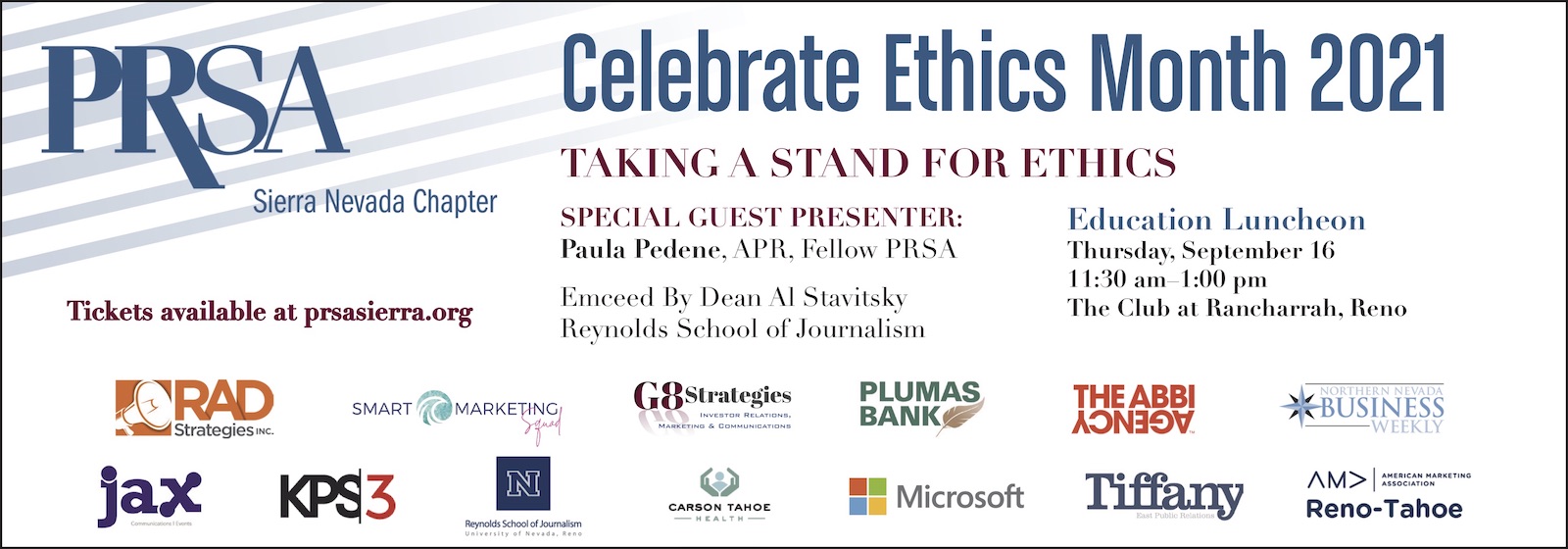April Conway and Ira M. Gostin | Special to the NNBW
Thursday, September 2, 2021
Introduction: April Conway, MBA, APR, and Ira M. Gostin, MBA, APR, are members of the Public Relations Society of America (PRSA) Sierra Nevada chapter and are both accredited public relations practitioners (APR). Conway is the Public Information Officer at the Reno Housing Authority, a former PIO at the Reno-Tahoe International Airport and a recently retired lieutenant colonel in the Nevada Air National Guard.Gostin is the managing director and chief strategist at G8 Strategies, headquartered in Reno and works with private and publicly traded companies in the mining and industrial sectors.To celebrate PRSA’s Ethics Month, Conway and Gostin provide insight about ethics in practical PR situations.TECHNOLOGYGostin: I believe that, more than ever, PR practitioners need to take extra care to ensure ethical behavior by their teams regarding the use of technology. It’s just too easy to lift a piece of text, use someone’s copyrighted image, or round the corners on a piece of information to fit a narrative.
I grew up in the newspaper business, first with newspapers and then with the Associated Press. To me, news coverage was always sacred and not something to be messed with. People don’t read newspapers anymore, they receive their daily news via social media, or on a smartphone, which has changed the deadline process.
Newspapers are always on deadline because it’s a 24-hour news cycle. It’s no longer good enough to be the best, just first. As PR practitioners, we help journalists do their jobs by providing them access to our clients and therefore the news that they cover. When we do our jobs properly, the stories can do their job and inform.
Conway: It’s incredibly tempting to simply re-write someone else’s words, especially when another author has gotten it just right. I like to combat that by ensuring the spokesperson in my organization doesn’t simply respond to media queries via email or text, but literally talks with them one on one, whether on the phone, Zoom or in person.There can be trepidation with that as conversations can naturally veer slightly off topic, but I find interviews done that way are more genuine, less formulaic, and educate reporters more roundly. They routinely garner better outcomes for my organization.
FIRST AMENDMENT
Conway: After 27 years in the military, most of which as a public affairs practitioner, I’ve likely heard more First Amendment arguments defending it, upholding it, or denigrating it, than most. There are few absolutes regarding it and nothing about it is clear and unwavering.In business, I honestly believe it’s better to let the courts decide than try to educate about the nuance of it. Which brings us to my soapbox about knowing a lot about judges we elect on the local level, but that’s a rant for another day.
Gostin: The first amendment is probably the most misunderstood law we have (Other than the Second Amendment!). As Americans, we take our rights of free speech and freedom of the press to heart as a birthright. But does the amendment really guarantee us anything? If you read it, it only speaks to congress passing laws that affect the media. It actually doesn’t say anything about freedom of speech. When Thomas Jefferson and James Madison drafted the First Amendment, could he even have imagined a Twitter or Facebook? I’m as passionate about defending our First Amendment as I am confused by it.
There’s a story floating around the internet right now: Can you imagine being on a call and AT&T breaks in and tells you that they don’t like your content and they disconnect your call, and later suspend or ban you? Apply that to social media now.
THE PUBLIC RELATIONS INDUSTRY
Gostin: PR is not the good-old boy network of the 50s where news was influenced over gin and a pack of smokes. As practitioners, we work to present our clients to the media and the public.But in my world, working with publicly traded companies, we walk a very fine line between the Security and Exchange Commission rules, the ethics of my two trade associations, PRSA and the National Investor Relations Institute (NIRI), the needs of the client and the privacy needed to run a business. The public has to demand public relations to follow an ethical path and as practitioners, it is our responsibility to uphold it.
Conway: While I’ve rarely seen a gaggle of PR types gather without some adult beverages floating around, Ira’s right. PR pros today don’t decide what anyone reads or hears. Particularly in the governmental and quasi-governmental world I live in, PR pros have a simple, yet wildly complicated role.We deliver the most helpful information we can to the largest number of people who we believe need to hear it. Unlike the practice of law, or accounting, or medicine, anyone can say they “do PR”, so that’s the reason any PR help you obtain should be educated in the craft of PR and live by the professional standards PRSA upholds.
PRSA Sierra Nevada — which sponsors this content — is dedicated to upholding ethical standards, providing professional development, fostering networking opportunities and recognizing strategic communications excellence in our region. Visit PRSA Sierra Nevada at prsasierra.org, and go here to see the PRSA code of ethics.

Comments
Use the comment form below to begin a discussion about this content.
Sign in to comment